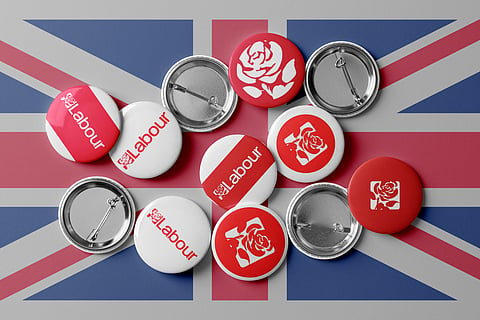

As Labour celebrates a landslide victory in the 2024 General Elections, what are the possible implications for the UK's seafood and aquaculture industries?
Image: Adobe Stock.
Today the United Kingdom woke up to a landslide election victory for Labour, following yesterday's General Election vote.
The final count is still pending, but so far Labour has won a majority of 403 seats, bringing an end to 14 years of Conservative government rule in the UK.
Sir Keir Starmer will now take over as Prime Minister from outgoing Conservative leader Rishi Sunak, winning on the back of a manifesto which bills "Sustained economic growth" as "Labour’s first mission for government".
This, the manifesto states, "means being pro-business and pro-worker... a more active, smarter government that works in partnership with business, trade unions, local leaders, and devolved governments."
But what might all this mean for the UK's aquaculture and seafood sectors?
Scottish Labour Party leader Anas Sarwar with members of the Young Aquaculture Society at the official launch during Aquaculture UK 2024.
Photo: Greg Macvean / Young Aquaculture Society.
While aquaculture is not specifically mentioned within Labour's election manifesto, it does highlight salmon as one of Scotland's "internationally renowned" products alongside whisky, and said "Labour will champion ‘Brand Scotland’ across the world through the Scotland Office, and our diplomatic and trade networks."
In the run-up to the election, the leader of the Scottish Labour Party, Anas Sarwar, also publicly voiced support for the sector.
Sarwar attended the Aquaculture UK conference and tradeshow held in Aviemore, Scotland during May, giving an address at the Salmon Scotland AGM, and meeting with the trade organization's Chief Executive Tavish Scott, to discuss the future of the salmon farming sector in Scotland.
“The Scottish salmon sector creates thousands of jobs and generates hundreds of millions of pounds for the economy," Sarwar said at the event.
“Food and drink should be viewed as an economic asset, and we need to build the right business environment in Scotland to help sectors like this thrive with responsible growth and high animal welfare standards," he continued.
“It’s vital that Scotland is seen as open for business, and a Labour government will prioritise economic growth so that we can deliver more high-skilled jobs, enable rural communities to flourish, and invest more in public services," Sarwar added.
Sarwar also formally launched the Young Aquaculture Society during the event.
“Aquaculture is a highly-skilled profession with a huge range of job opportunities for young people,” Sarwar stated at the YAS launch.
“It was a privilege to formally launch YAS, and I look forward to hearing more from the organization as it develops networks, builds partnerships, and creates opportunities for the leaders of tomorrow.”
The new Labour government plans to invest £1.8 billion to upgrade ports and build supply chains across the UK.
Photo: Labour Party Manifesto.
Among its election pledges, Labour says it will establish a National Wealth Fund, capitalised with £7.3 billion (EUR 8.6bn / USD 9.3bn) over the course of the next Parliament.
This includes a plan to allocate £1.8 billion (EUR 2.1bn / USD 2.3bn) to upgrade ports and build supply chains across the UK.
The Labour party has also said it intends to make it easier for UK businesses to access international markets, including the EU following Brexit.
In its manifesto, Labour said it would "use every lever available to get UK business the access it needs to international markets. This will promote the highest standards when it comes to food production".
“We will reset the relationship and seek to deepen ties with our European friends, neighbors, and allies. That does not mean reopening the divisions of the past. There will be no return to the single market, the Customs Union, or freedom of movement. Instead, Labour will work to improve the U.K.’s trade and investment relationship with the E.U. by tearing down unnecessary barriers to trade," the manifesto states.
Labour's Shadow Environment Minister Toby Perkins has pledged that the UK will ratify the UN "High Seas" Treaty.
Photo: Labour Party.
Regarding fisheries and marine protection, the Labour party has pledged to enact a ban on bottom-trawling in UK waters, and will also ratify the UN's Global Ocean Treaty, sometimes referred to as the "High Seas" treaty.
Labour's Shadow Environment Minister Toby Perkins said at a House of Commons debate on nature conservation on 28 June that Labour would "stop destructive bottom trawling that is destroying our ocean ecosystem”, and said this would be “one of our first measures” if voted into power.
In March, the UK's then Conservative government already announced a ban on bottom trawling in 13 of the UK's 178 marine protected areas, covering a total area of 4,000 square kilometers.
Perkins said the Labour Party will also ratify adoption of the Global Ocean Treaty presented by the United Nations in 2023 - an agreement aiming to protect 30% of the oceans by 2030, particularly in ocean areas outside national jurisdictions.
The treaty, which has now been signed by 91 countries, requires 60 countries to ratify it. To date, only 8 countries have done so.
“The global ocean treaty was incredibly important, but it still hasn’t been ratified in UK law. We will do that as one of our first measures in government,” Perkins said.
Details of the new government cabinet are due to be released over the weekend, 6-7 July.
In the UK, aquaculture, fisheries and seafood fall under the remit of the Department for the Environment, Food and Rural Affairs (DEFRA).
Labour's proposed ministers for this department are currently listed as:
Steve Reed, Shadow Secretary of State for the Environment, Food and Rural Affairs
Daniel Zeichner, Shadow Minister for Farming, Food and Fisheries
Ruth Jones, Shadow Minister for Environmental Protection and Animal Welfare
Toby Perkins, Shadow Minister for Nature and Rural Affairs
Emma Hardy, Shadow Minister for Flooding, Oceans and Coastal Communities
